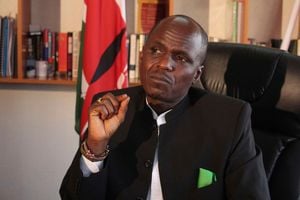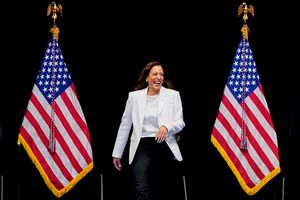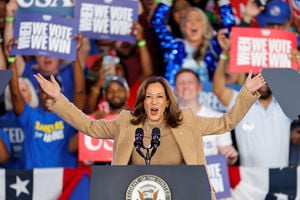
Donald Trump gestures during a campaign event at Dorton Arena, in Raleigh, North Carolina, US on November 4, 2024.
High noon, January 20, 2029, Capitol building, Washington, DC — a new President-elect takes the oath of Office as the 48th President of the United States of America. “Change,” John F. Kennedy told us, “is the law of life”. But “those who look only to the past or present”, President Kennedy warned, “are certain to miss the future.”
Africa must take stock of its hits and misses over the last eight years of Donald J. Trump I (2017-2021) and the Joe Biden interlude (2021-2025) in order to win the future in Trump II (2025-2029). The mantle of managing change in the age of Trump II must pass to the continent’s best and ablest. Those in power must seek knowledge, and those with knowledge must seek power — or miss the future, and perish. In the age of Trump II, Africa must be as protean as Eneke the bird in the Igbo proverb: “Since men have learned to shoot without missing, I have learned to fly without perching on a twig.” Here is the rule of the thumb: Ignore Trump’s worst, reap his best.
As I watch the 45th president of the United States declare victory, I am in Shanghai attending the Annual China International Import Expo (CIIE) and as a speaker at the Hongqiao International Economic Forum. The expo brought home some hard truths. Africa had only 26 booths out of a total of 3,496 exhibitors at the grand expo. This mirrors the continent’s small share of global merchandise trade, which stood at 2.7 per cent in 2023. Africa's share of a total of over $20 trillion in global export trade over 2013-2018 was less than $1 trillion. Africa must industrialize to lift the bulk of its 1.4 billion souls from poverty.
No wars
Facing the future, economies grow in time of peace. Trump has promised that there will be no wars during his presidency, and I am inclined to take him at his word. True, Trump is temperamental. But in his vices, he is highly predictable. Certainly, he is not your gun-slinging, cold and calculating gung-ho cow boy. Based on his past record, he is more likely to be safer for the world than his predecessors. George W. Bush took America to war in Afghanistan and Iraq. Barack Obama ordered airstrikes in seven different countries, including destroying Libya.
Trump II is the best time for Africa to decolonise its mind, and civilization. Yes, Trump is a populist and a master of rhetoric — as all good politicians. But I doubt he will use a dime to stoke a ‘Clash of Civilizations.’ He is not your armour-plated crusader for the most idiosyncratic social mores of Western civilization. Unlike Democrats, Republicans are unlikely to sacrifice development over liberal preferences and practices. Ugandan President Yoweri Museveni has every reason to celebrate the triumph of Trump. His country is still reeling under the effects of cutbacks on development aid and biting sanctions on government officials as punishment by the Biden-Harris White House for passing and enforcing an anti-LGBTQ law.
Africa cannot wish away Trump’s “America First” brand of nationalism. The Biden-era globalist projects are its immediate casualty. The future of the Kenya-led Haiti Mission is uncertain. America is unlikely to use its diplomatic resources to support Raila Odinga’s win as chairperson of the African Union Commission (AUC). Trump’s promise to end the Ukraine-Russia war is music to the ears of Africa, which has faced heavy economic costs of the war. Africans championing global climate action have no ally in Trump — the world’s highest ranking ‘climate denier’ — who has parodied climate change as “a big hoax.”
Inversely, Africans championing development have an ally in Trump. Democracy, after all, is a luxury if you can’t pay your bills. Trump is a dye-in-the-wool Republican businessman whose campaign mantra was, as they say, ‘it is the economy, stupid!’ His business-oriented foreign policy will prioritize trade and investments with Africa. We expect continuities and discontinuities between the Biden and Trump administrations. Most likely, the Clinton-era African Growth and Opportunity Act (AGOA) will continue.
Investment agreements
Beyond AGOA, Africa must do the heavy lifting to get Trump’s America to speed up negotiations on investment agreements. Kenya has to prioritise the completion of the 470-kilometre, $3.6 billion Nairobi-Mombasa Expressway project, agreed upon with the Trump Administration in February 2018. The project returned onto the table during President William Ruto's State visit to the United States in May 2024, but the negotiations are in limbo after Trump’s election. Nairobi also has to get Washington to restart negotiations on the Comprehensive High Quality Trade Agreement with Kenya agreed upon when President Uhuru Kenyatta visited White House in February 2020. Under Biden, Trump-era trade talks were watered down into “investment partnership with Kenya” that seeks non-tariff ways to facilitate trade.
If there is one issue Trump and Vice-President Kamala Harris agreed on, it is their shared suspicion and desire to contain China as a threat to American interests. Africa risks been caught in the cross-fire of geopolitical and trade wars between America and China.
America is playing catch-up to China in Africa. Trump is unlikely to establish a coherent and superior plan to engage Africa as Beijing has done over the last 24 years. Through the Forum on China-Africa Cooperation (FOCAC), the world’s largest and most impactful Africa+1 forum, China has provided the largest civilisation-to-civilisation development bailout to Africa, estimated at over $250 billion since 2000, $50.7 billion in September 2024. Through its Belt and Road Initiative (BRI), Beijing has supported market access, capacity building and infrastructure, including building or upgrading 100,000 kilometres of highways; 200,000 kilometres of fibre-optic cables; over 10,000 kilometres of railways; and 200 ports. Africa has backed lock, stock, and barrel China’s initiatives to remake a new multipolar world order.
As Biden winds up his tenure and hands over to Trump, he has prioritized a trip to Angola in December. Here, the Lobito Corridor initiative commenced 18 months ago as a flagship project of the Partnership for Global Infrastructure and Investment (PGII), launched by the G7 Summit in Germany in 2022 to counter China’s BRI. Biden’s legacy in Africa, now hangs in the balance after Trump’s election. Trump has put Beijing on notice that his administration will impose 60 per cent tariffs on Chinese imports into America. Africa should brace for a new round of trade wars, which will exact a heavy toll on its economies.
Professor Peter Kagwanja is former Government Adviser and currently the Chief Executive at the Africa Policy Institute.









